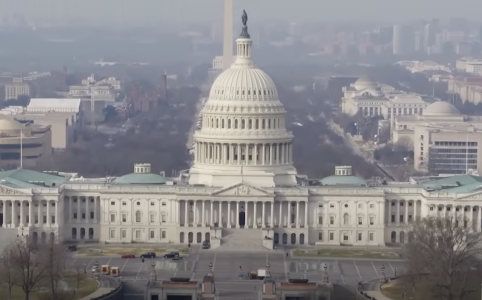Trump’s “big, beautiful” budget: What it means for taxes, seniors, and immigration
- Replies 8
Donald Trump’s One Big Beautiful Bill is making waves in Washington—and if you’re over 60, you might be wondering: What does this sweeping legislation mean for your wallet, your healthcare, and the country’s future?
Here at The GrayVine, let’s break down the bill’s key points, adding context, and giving you the straight talk you deserve.
Whether you’re keeping an eye on politics or just want to know how this could affect your day-to-day life, we’ve got you covered.
A Quick Overview: What’s in the Bill?
The Republican-led House of Representatives passed the One Big Beautiful Bill on Thursday, a major piece of legislation that reflects President Donald Trump’s current priorities on taxation and federal spending.
The bill now moves to the Senate, where Republicans hold a majority but are expected to propose their own revisions.
Let’s unpack what’s inside, what it means for you, and what’s at stake for the country.

Those cuts, which lowered income tax rates and raised the standard deduction, were set to expire this year.
The new bill would make them permanent and further increase the standard deduction through 2028 by $1,000 for individuals, $1,500 for heads of households, and $2,000 for married couples filing jointly.
Seniors may benefit from an additional $4,000 deduction if they are age 65 or older and have an adjusted gross income below $75,000 (for single filers) or $150,000 (for couples). However, all of these incentives are set to expire at the end of 2028.
Also read: Could a $4,000 tax break be coming for Social Security recipients?
The new bill increases the cap to $40,000 per year, providing relief to many residents in those areas.

It also includes more than $50 billion for building border fortifications, which may include new segments of the border wall along the US-Mexico border.
Additionally, new court fees could make it more difficult for immigrants to seek asylum or relief through the legal system.
Source: LiveNOW from FOX / Youtube.
Some experts believe judges may find ways around this in future rulings, but the short-term implications could be significant.
Analysts at the Urban Institute estimate that as many as 5.2 million people could lose Medicaid coverage, while the Center on Budget and Policy Priorities projects that nearly 11 million people could be removed from SNAP.
Also read: Will your Social Security checks get bigger? The truth behind the GOP tax bill
By contrast, low-income households may see their resources decrease by 4% in 2033, largely because of reductions in social benefits.
Tax credits for electric vehicles would end this year, and incentives for wind and solar projects would only be available for projects that begin construction within 60 days of the bill’s enactment and are completed by 2028.
Clean energy manufacturing credits would be eliminated by 2031, and subsidies for home energy efficiency upgrades would end after this year.
Source: Forbes Breaking News / Youtube.
Read next: Are you missing out? Find out if you qualify for Trump’s new senior tax break—and how much you could save

What do you think about the One Big Beautiful Bill? Are you worried or excited? Do you have questions about how these changes could affect your family or community? Share your thoughts in the comments below!
Here at The GrayVine, let’s break down the bill’s key points, adding context, and giving you the straight talk you deserve.
Whether you’re keeping an eye on politics or just want to know how this could affect your day-to-day life, we’ve got you covered.
A Quick Overview: What’s in the Bill?
The Republican-led House of Representatives passed the One Big Beautiful Bill on Thursday, a major piece of legislation that reflects President Donald Trump’s current priorities on taxation and federal spending.
The bill now moves to the Senate, where Republicans hold a majority but are expected to propose their own revisions.
Let’s unpack what’s inside, what it means for you, and what’s at stake for the country.

The US House of Representatives has passed Trump's One Big Beautiful Bill featuring permanent extensions to his first-term tax cuts, increased standard deductions, and new tax write-offs that mainly benefit higher earners, with most provisions expiring after 2028. Image source: The Telegraph / Youtube.
Tax Cuts Extended and Expanded
A key provision in the bill is the extension of tax cuts originally passed during Trump’s first term in office under the Tax Cuts and Jobs Act of 2017.Those cuts, which lowered income tax rates and raised the standard deduction, were set to expire this year.
The new bill would make them permanent and further increase the standard deduction through 2028 by $1,000 for individuals, $1,500 for heads of households, and $2,000 for married couples filing jointly.
Temporary New Deductions—Including for Seniors
The bill introduces several new tax exemptions that would remain in effect only while Trump is president. These include deductions for tip and overtime income, as well as interest on car loans—if the vehicle was assembled in the United States.Seniors may benefit from an additional $4,000 deduction if they are age 65 or older and have an adjusted gross income below $75,000 (for single filers) or $150,000 (for couples). However, all of these incentives are set to expire at the end of 2028.
Also read: Could a $4,000 tax break be coming for Social Security recipients?
Expanded SALT Deduction
The legislation also raises the cap on the State and Local Tax (SALT) deduction. This deduction was previously limited to $10,000 under the 2017 tax law, a change that affected taxpayers in states with higher local taxes like New York, New Jersey, and California.The new bill increases the cap to $40,000 per year, providing relief to many residents in those areas.

The bill allocates massive funding for mass deportations and new border fortifications, including $45 billion for detention centers, $14 billion for deportation operations, and more than $50 billion for border walls, alongside measures making it harder for asylum seekers to enter or stay in the country. Image source: KENS 5 / Youtube.
Increased Immigration and Border Security Funding
Significant funding is allocated toward immigration enforcement and border infrastructure. The bill provides $45 billion for Immigration and Customs Enforcement (ICE) detention facilities, $14 billion for deportation operations, and funds to hire 10,000 additional ICE agents by 2029.It also includes more than $50 billion for building border fortifications, which may include new segments of the border wall along the US-Mexico border.
Additionally, new court fees could make it more difficult for immigrants to seek asylum or relief through the legal system.
Deficit to Rise by Trillions
The Congressional Budget Office (CBO) estimates that the bill’s tax provisions alone will increase the federal deficit by $3.8 trillion. While supporters emphasize economic growth and tax relief, critics warn of the long-term fiscal consequences.Source: LiveNOW from FOX / Youtube.
Restrictions on Federal Court Enforcement
A controversial provision would prevent federal courts from enforcing contempt citations related to temporary restraining orders and preliminary injunctions. Legal scholars warn that this could impact ongoing litigation—especially in immigration-related cases—and render existing court orders unenforceable.Some experts believe judges may find ways around this in future rulings, but the short-term implications could be significant.
Cuts to Medicaid and SNAP
To offset the bill’s high cost, Republicans have proposed cuts to two major social programs: Medicaid and the Supplemental Nutrition Assistance Program (SNAP). Both programs would see reduced funding and the introduction of new work requirements.Analysts at the Urban Institute estimate that as many as 5.2 million people could lose Medicaid coverage, while the Center on Budget and Policy Priorities projects that nearly 11 million people could be removed from SNAP.
Also read: Will your Social Security checks get bigger? The truth behind the GOP tax bill
More Gains for the Wealthy Than the Poor
The bill’s benefits are expected to favor wealthier Americans. According to the CBO, the top income earners would see their household resources increase by 4% in 2027 and 2% in 2033, mostly due to tax cuts.By contrast, low-income households may see their resources decrease by 4% in 2033, largely because of reductions in social benefits.
Rollbacks on Clean Energy Incentives
Several climate and clean energy incentives passed during President Biden’s term would be phased out under the new bill.Tax credits for electric vehicles would end this year, and incentives for wind and solar projects would only be available for projects that begin construction within 60 days of the bill’s enactment and are completed by 2028.
Clean energy manufacturing credits would be eliminated by 2031, and subsidies for home energy efficiency upgrades would end after this year.
Source: Forbes Breaking News / Youtube.
Debt Ceiling Increased by $4 Trillion
Lastly, the bill raises the US debt limit by $4 trillion. This increase is intended to prevent a potential default, which Treasury Secretary Scott Bessent warned could occur as early as August if borrowing authority is not extended.Read next: Are you missing out? Find out if you qualify for Trump’s new senior tax break—and how much you could save
Key Takeaways
- The US House of Representatives has passed Trump's One Big Beautiful Bill featuring permanent extensions to his first-term tax cuts, increased standard deductions, and new tax write-offs that mainly benefit higher earners, with most provisions expiring after 2028.
- The bill allocates massive funding for mass deportations and new border fortifications, including $45 billion for detention centers, $14 billion for deportation operations, and more than $50 billion for border walls, alongside measures making it harder for asylum seekers to enter or stay in the country.
- To offset costs, the legislation proposes significant cuts and work requirements for welfare programs like Medicaid and SNAP, which experts warn could strip millions of Americans of healthcare and food assistance, disproportionately impacting the poorest households.
- The bill also ends Biden-era green energy incentives, raises the debt ceiling by $4 trillion, provides more tax benefits to wealthier Americans, and includes controversial measures to restrict the enforcement powers of federal courts.
What do you think about the One Big Beautiful Bill? Are you worried or excited? Do you have questions about how these changes could affect your family or community? Share your thoughts in the comments below!






